Why is a Raccoon Unfit as a Service Animal?
Raccoons, though highly intelligent and dexterous, pose considerable challenges as service animals. Their nocturnal nature, unpredictable behavior, and propensity for aggression complicate training and reliability.
Additionally, health risks such as rabies and other zoonotic diseases present significant safety concerns. Despite their problem-solving capabilities, raccoons are difficult to train to the consistency required for service roles.
Legal and ethical issues further complicate their use. While certain cases show emotional benefits, the overall feasibility of employing raccoons as service animals remains low.
To understand more about the complexities and considerations involved in using raccoons as service animals, further information is available.
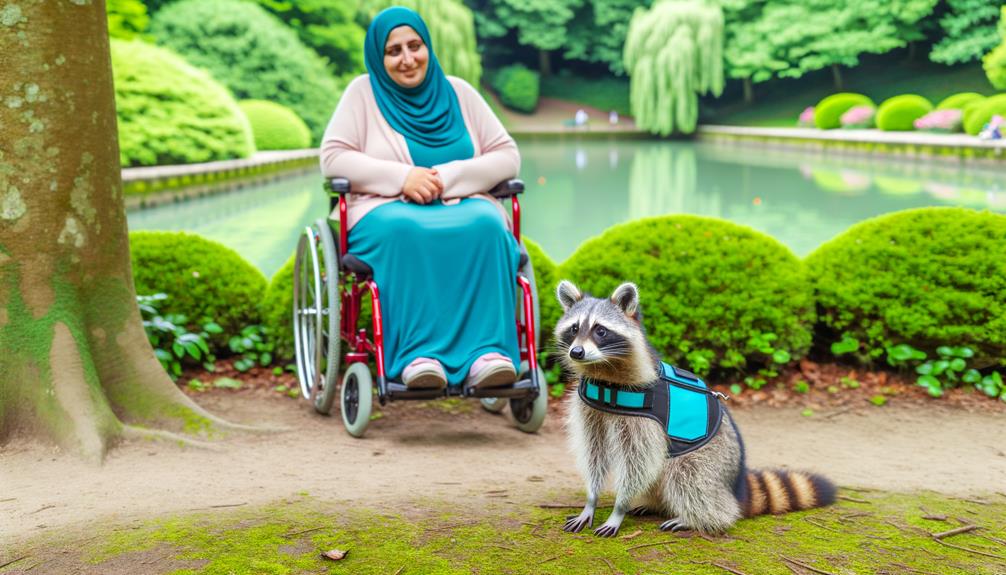
Key Takeaways
- Raccoons' nocturnal nature and unpredictable behavior complicate their reliability as service animals.
- High training complexity and specialized protocols are required for raccoons due to their intelligence and curiosity.
- Health risks include rabies and zoonotic diseases, making raccoons unsuitable for public service roles.
- Legal restrictions and ethical concerns often prohibit the use of raccoons as service animals.
- Traditional service animals are more reliable and easier to train compared to raccoons.
Definition of Service Animals
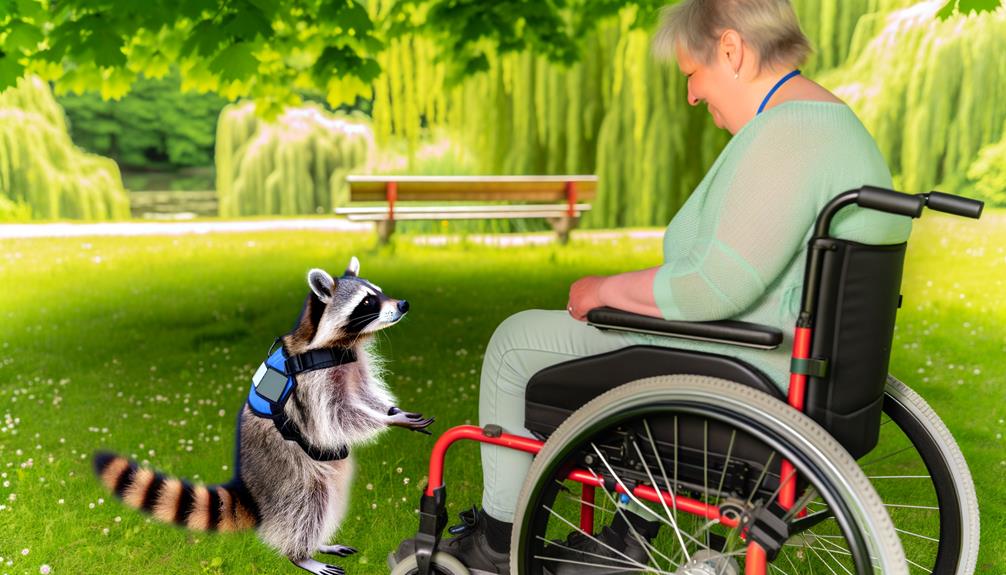
Under the Americans with Disabilities Act (ADA), a service animal is defined as a dog that has been individually trained to perform tasks or do work for an individual with a disability. The tasks performed by the service dog must be directly related to the person's disability and can include guiding individuals who are visually impaired, alerting individuals who are deaf, pulling a wheelchair, or alerting and protecting a person who is having a seizure.
The key criterion is the specific training the dog has undergone to assist with the disability. It is important to distinguish service animals from emotional support animals, as the latter do not have the specialized training to perform tasks related to an individual's disability.
Legal Requirements
The legal requirements for service animals are primarily governed by the Americans with Disabilities Act (ADA), which specifies that only dogs and, in some cases, miniature horses qualify as service animals.
State-specific regulations may vary, potentially allowing for a broader range of species, but these variations still must align with federal standards.
Additionally, the certification process for service animals involves rigorous training and documentation, ensuring that the animal can perform specific tasks to assist individuals with disabilities.
ADA Service Animal Definition
According to the Americans with Disabilities Act (ADA), a service animal is specifically defined as a dog that has been individually trained to perform tasks for an individual with a disability. The tasks performed must be directly related to the person's disability and can include guiding individuals who are blind, alerting individuals who are deaf, pulling a wheelchair, or alerting and protecting a person who is having a seizure.
The ADA's definition explicitly excludes other species of animals, whether wild or domestic, trained or untrained. This narrow definition ensures that only dogs with specific training to mitigate a person's disability are recognized as service animals under federal law.
Emotional support, therapy, and companion animals do not qualify as service animals under the ADA.
State-Specific Regulations
While the ADA provides a federal framework for the definition of service animals, individual states may have their own specific regulations and legal requirements that either align with or differ from federal guidelines. These state-specific regulations can influence the types of animals permitted as service animals, including whether a raccoon can be classified as one. Some states adhere strictly to the ADA's definition limiting service animals to dogs and miniature horses, while others may have more lenient policies.
| State | Service Animal Definition |
|---|---|
| California | Adheres to ADA, dogs and miniature horses only |
| Florida | Similar to ADA, does not recognize raccoons |
| Texas | Follows ADA; strict on non-traditional animals |
| New York | Primarily adheres to ADA, rare exceptions possible |
| Oregon | Flexible, but raccoons generally not recognized |
Understanding these regulations is essential for compliance and ensuring proper accommodation.
Certification Process
Understanding the certification process for service animals involves grasping both federal and state-specific legal requirements, which are crafted to guarantee that animals meet the necessary criteria to assist individuals with disabilities. Federally, the Americans with Disabilities Act (ADA) primarily recognizes dogs and, in specific cases, miniature horses as service animals. This legislation mandates that the animal must be individually trained to perform tasks directly related to the handler's disability.
State regulations may vary, with some requiring additional certifications or registrations. It is worth noting that raccoons are generally not recognized under these guidelines, as their behavior and training capabilities do not align with the stringent criteria set forth by the ADA and various state laws.
Raccoon Characteristics
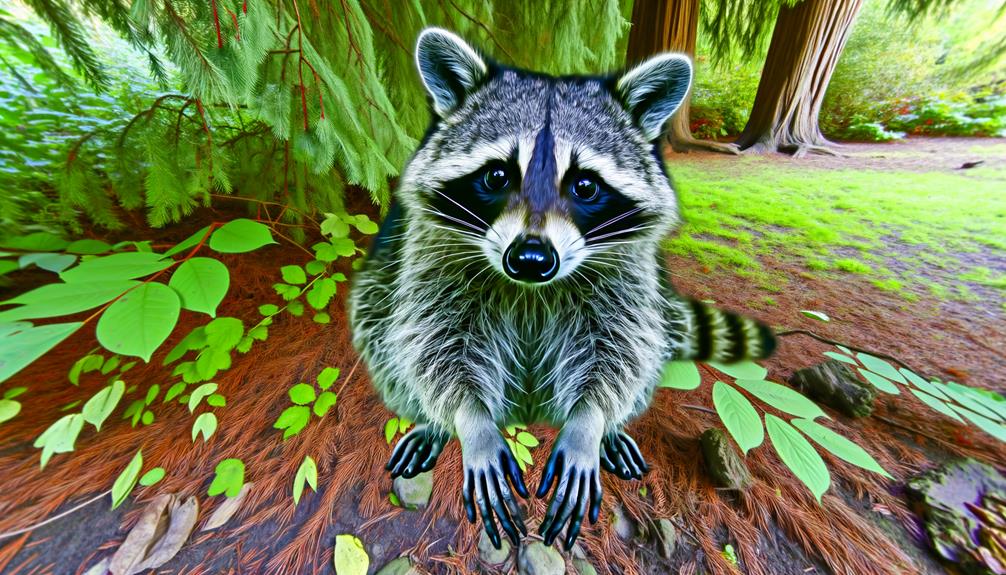
Raccoons, scientifically known as Procyon lotor, are medium-sized mammals characterized by their distinctive facial mask and dexterous front paws. These animals typically weigh between 8 to 20 pounds and measure around 16 to 28 inches in body length, excluding their bushy, ringed tail.
Their front paws are highly adaptable, resembling human hands, which allow them to manipulate objects with precision. Raccoons are omnivorous, with a diet that includes fruits, nuts, insects, and small vertebrates. They are primarily nocturnal, exhibiting peak activity during the night.
Their intelligence is notable, with problem-solving abilities that often surpass those of domestic animals. Socially, raccoons tend to be solitary, except during mating season or when raising offspring. Their adaptability and resourcefulness underscore their complex behavioral patterns.
Training Challenges
Training raccoons as service animals presents significant challenges due to their complex behavioral traits. These include high levels of curiosity and problem-solving abilities. These animals require specialized training that is more intensive and tailored compared to traditional service animals.
Additionally, ensuring consistency and reliability in their performance is problematic, given their natural tendencies toward unpredictable behavior.
Complex Behavioral Traits
Raccoons exhibit a range of complex behavioral traits that present significant challenges when attempting to train them as service animals. Their high intelligence and problem-solving abilities make them difficult to control. Additionally, their nocturnal nature and instinctual behaviors can be disruptive in the environments where service animals are typically required to operate. Raccoons are also known for their stubbornness and independent streak, which complicates consistent training.
- Unpredictable aggression towards strangers
- Tendency to explore and escape confined spaces
- Difficulty in maintaining focus on tasks
- Potential for transmitting zoonotic diseases
These behavioral characteristics underscore the challenges in training raccoons to perform reliably as service animals, highlighting the need for intensive and specialized training regimens.
Specialized Training Requirements
Given the inherent behavioral complexities of raccoons, devising specialized training protocols to mitigate these challenges is paramount for their potential role as service animals. Raccoons exhibit high levels of curiosity, dexterity, and independence, necessitating a training regimen that addresses these traits explicitly.
A thorough approach would involve positive reinforcement techniques to shape desired behaviors while minimizing disruptive tendencies. Additionally, the training must encompass desensitization exercises to acclimate raccoons to various environments, stimuli, and social interactions.
Due to their nocturnal nature, adjusting their activity patterns to align with human schedules is another critical aspect. The intricate balance of behavioral conditioning, environmental adaptation, and schedule synchronization underscores the rigorous demands of preparing raccoons for service roles.
Consistency and Reliability Concerns
Ensuring consistency and reliability in the behavior of raccoons poses notable challenges due to their innate unpredictability and intricate cognitive traits. Raccoons exhibit a high degree of behavioral variability, which complicates their training as service animals.
Their nocturnal nature and problem-solving abilities, while fascinating, lead to inconsistencies that undermine their dependability. Additionally, raccoons require extensive socialization to mitigate their natural wariness and potential aggression, yet these efforts often yield inconsistent results.
- Unpredictable behavior: Raccoons may suddenly act out, causing distress.
- Intricate cognitive traits: Their intelligence can lead to unexpected and disruptive actions.
- Nocturnal tendencies: Activity patterns clash with typical human schedules.
- Aggression risks: Even well-socialized raccoons can exhibit sudden aggression.
These factors greatly hinder the feasibility of raccoons as reliable service animals.
Behavioral Considerations
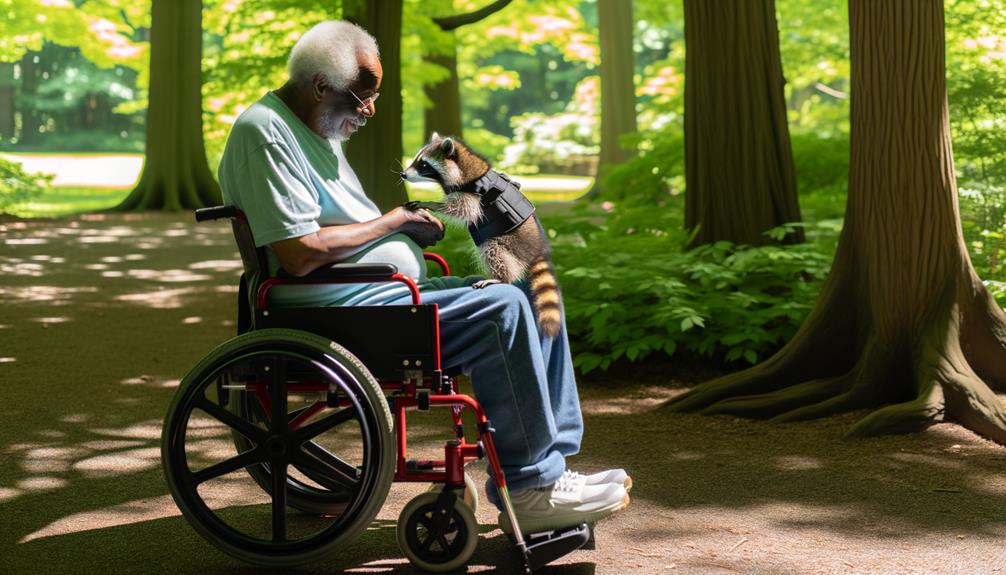
The behavioral tendencies of raccoons, including their natural curiosity and nocturnal habits, must be carefully evaluated when considering them as potential service animals. Raccoons exhibit high levels of inquisitiveness and problem-solving skills, which can lead to unpredictable behaviors.
Their nocturnal nature may result in misalignment with the diurnal schedules of humans, posing challenges for consistent, day-time service roles. Additionally, raccoons have a propensity for exploring and manipulating objects, which could interfere with their ability to focus on specific tasks required of service animals.
Socially, raccoons can be solitary or aggressive, particularly when threatened, which raises concerns about their reliability and temperament in diverse environments. These behavioral characteristics necessitate a thorough assessment for suitability in service animal roles.
Health and Safety
Understanding the behavioral intricacies of raccoons is fundamental, but equally important are the health and safety considerations associated with their potential role as service animals.
Raccoons are known carriers of various zoonotic diseases, such as rabies and leptospirosis, which pose significant health risks to humans. Their sharp claws and teeth can cause serious injuries if they feel threatened or become agitated. Additionally, raccoons exhibit behaviors that might lead to property damage and unsanitary conditions.
- Rabies transmission risk
- Potential for physical injury from bites and scratches
- Risk of leptospirosis and other zoonotic diseases
- Property damage and hygiene issues
These factors necessitate a careful evaluation of health and safety implications before considering raccoons as viable service animals.
Public Perception
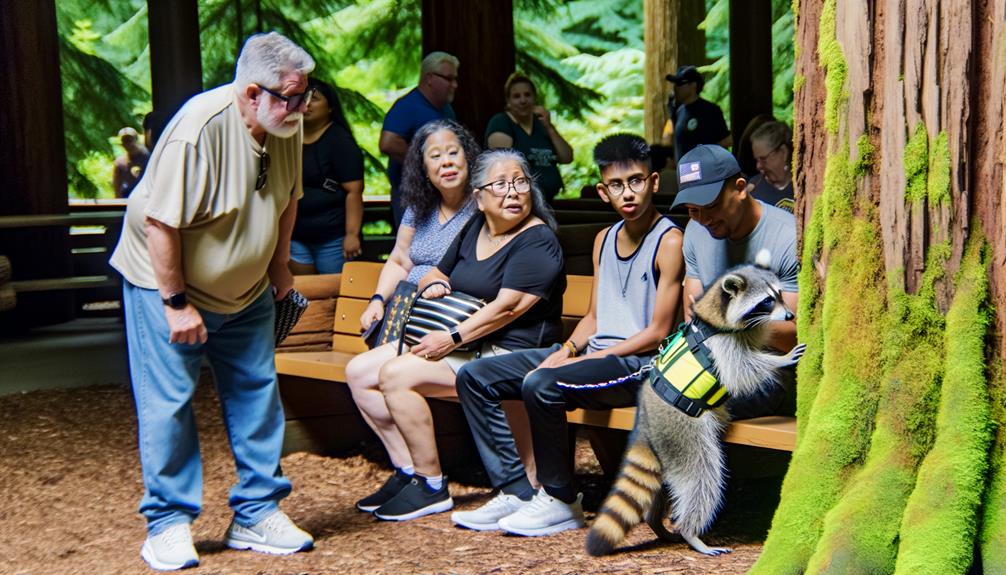
Public perception of raccoons as service animals is shaped by common misconceptions and media influence. Misunderstandings about the capabilities and behaviors of raccoons often lead to skepticism about their suitability in service roles.
Additionally, portrayals in media can skew public opinion, either by romanticizing their potential or highlighting negative stereotypes.
Common Misconceptions
Despite their increasing presence in popular media as quirky pets, raccoons are often mistakenly believed to be suitable as service animals due to their intelligence and dexterity. However, several misconceptions persist regarding their capabilities and appropriateness for such roles.
- Behavioral unpredictability: Raccoons, being wild animals, exhibit unpredictable behaviors that can be hazardous.
- Health risks: They are potential carriers of zoonotic diseases, posing significant health risks.
- Legal restrictions: Many jurisdictions have laws prohibiting the domestication or use of raccoons as service animals.
- Training challenges: Unlike traditional service animals, raccoons lack the consistent trainability required for complex tasks.
Understanding these misconceptions is essential for ensuring public safety and maintaining the integrity of service animal roles.
Media Influence
The portrayal of raccoons in media as friendly, trainable pets greatly skews public perception, often leading to misguided beliefs about their suitability as service animals. Television shows, movies, and social media frequently depict raccoons engaging in anthropomorphic behaviors, which can create an unrealistic image of their capabilities and temperament.
Scientifically, raccoons are wild animals with complex behavioral patterns and potential for unpredictability, making them ill-suited for the structured demands of service animal roles. While they may display moments of intelligence and problem-solving skills, their natural tendencies include aggression and destructiveness when stressed or threatened.
Relying on media portrayals rather than empirical evidence can lead to misconceptions and ultimately undermine the effectiveness and safety of service animal practices.
Case Studies
Several documented case studies provide insights into the feasibility and challenges of raccoons serving as service animals. These studies have revealed both the potential benefits and significant obstacles associated with employing raccoons in this capacity.
- Emotional Bonding: One case noted a profound emotional connection between the raccoon and its handler, contributing positively to the handler's mental health.
- Behavioral Issues: Another study highlighted the unpredictable behavior of raccoons, making them less reliable in high-stress situations compared to traditional service animals.
- Training Difficulties: Research indicated the extensive time and effort required to train raccoons, often exceeding that of more conventional service animals.
- Legal and Ethical Concerns: Several cases raised questions about the legal status and ethical implications of utilizing raccoons as service animals, as they are not typically recognized under current legislation.
Alternative Service Animals
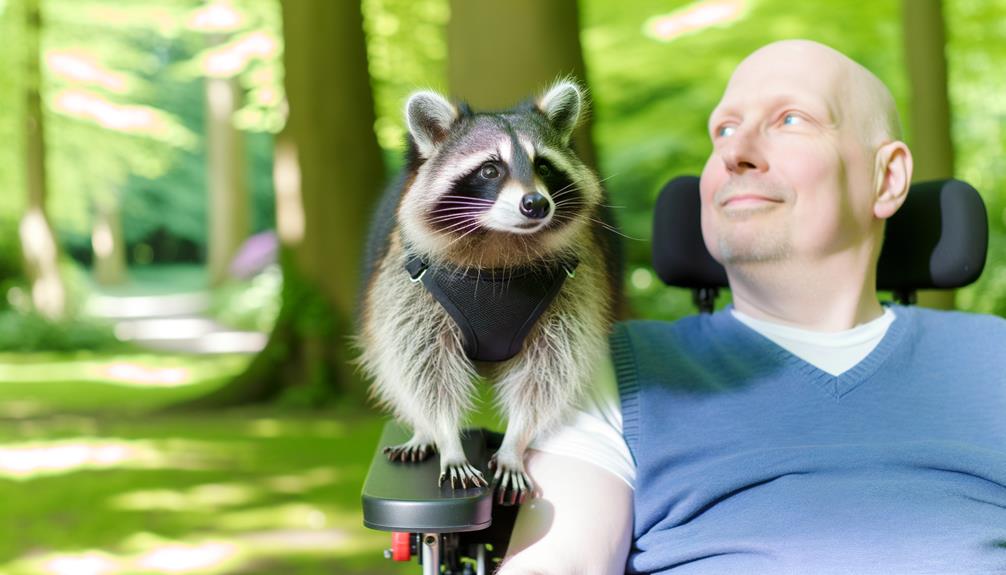
Numerous animals beyond the traditional categories of service dogs have been explored for their potential to assist individuals with disabilities, each offering unique benefits and challenges.
Miniature horses, for example, are used for mobility assistance due to their strength and calm demeanor.
Capuchin monkeys have been trained to assist individuals with spinal cord injuries by performing tasks such as fetching items and operating light switches.
Even pot-bellied pigs have been considered for their intelligence and ability to detect health changes in their owners.
However, the suitability of these animals varies based on factors like temperament, trainability, and legal status under the Americans with Disabilities Act (ADA).
Pros and Cons
Evaluating the pros and cons of using raccoons as service animals requires a thorough examination of their behavior, trainability, and compatibility with human needs compared to other alternative service animals. Raccoons, known for their dexterous paws and problem-solving skills, offer unique advantages in performing specific tasks. However, they present significant challenges due to their nocturnal nature and potential for aggression if not socialized properly. Additionally, raccoons are not domesticated, which raises concerns about their reliability and safety in various environments.
- Pros:
- High dexterity for complex tasks
- Problem-solving abilities
- Unique skill set compared to traditional service animals
- Cons:
- Nocturnal habits
- Potential for aggression
- Lack of domestication leading to unpredictability
Future Possibilities
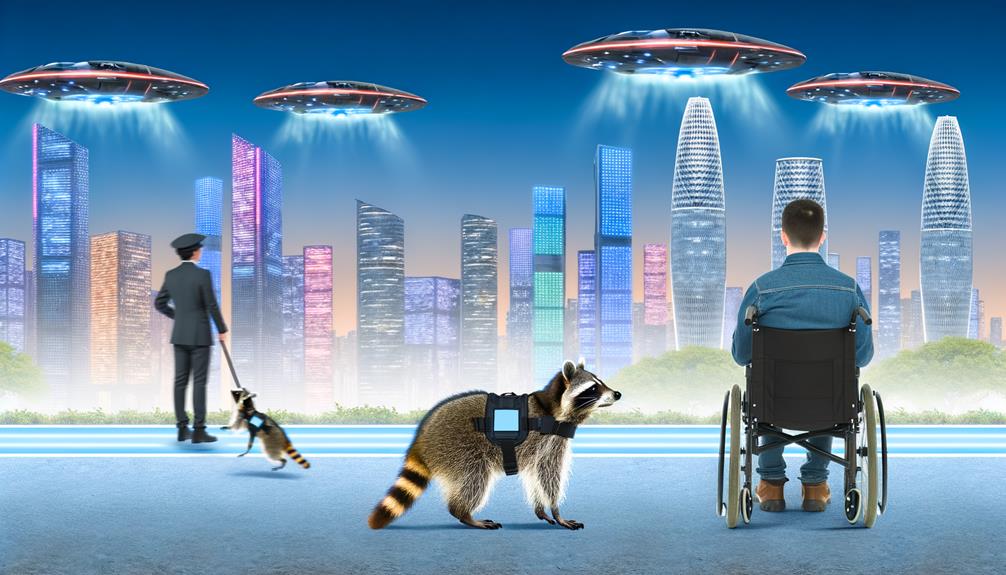
Considering advancements in animal behavior research and training methodologies, the future possibilities for raccoons as service animals may expand substantially beyond their current limitations. Enhanced understanding of raccoon cognition and adaptability could lead to more effective training protocols, enabling them to perform a broader range of tasks. Genetic research may also play a role in selectively breeding raccoons with temperaments more suited for service roles. However, ethical considerations and regulatory frameworks will need to be addressed to integrate raccoons into service animal programs.
| Potential Advancements | Benefits | Challenges |
|---|---|---|
| Improved Training | Increased task capabilities | High training complexity |
| Genetic Selection | Better temperament control | Ethical and legal concerns |
| Behavioral Research | Optimized training methods | Long-term study requirements |
These advancements could redefine the feasibility of raccoons in service roles.
Conclusion
The concept of raccoons as service animals presents an ironic juxtaposition. Legally, service animals are defined by rigorous standards, typically favoring dogs due to their trainability and predictable behavior.
Raccoons, with their nocturnal habits, dexterous paws, and unpredictable nature, pose significant training and behavioral challenges. While intriguing case studies exist, the practicality of raccoons as service animals remains dubious.
Consequently, future consideration of alternative service animals appears more viable, highlighting the incongruity of raccoons within this specialized role.






